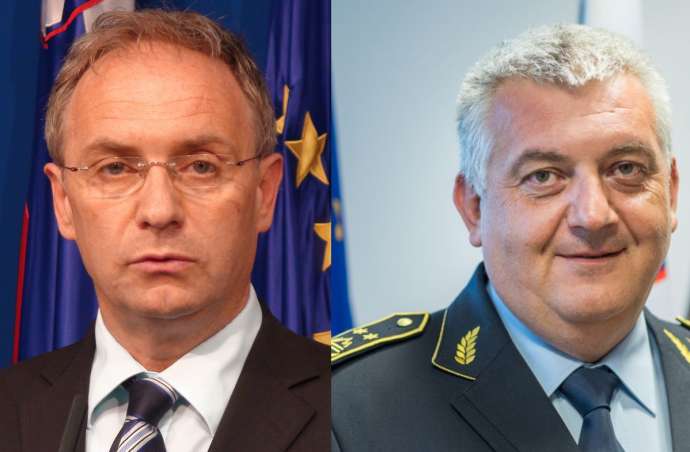STA, 30 June 2020 - Interior Minister Aleš Hojs told the press on Tuesday that he had tendered his resignation to PM Janez Janša and that Janša accepted it. Hojs, who suggested the investigation into ventilator procurement showed the police were serving the deep state, added he had accepted the resignation of Police Commissioner Anton Travner before that.
Hojs linked the resignation to the house searches conducted today by the National Bureau of Investigation (NBI) at several locations, including with Economy Minister Zdravko Počivalšek. Media have reported police suspect abuse of office in the March procurement of medical ventilators.
Hojs said he had been informed that the sting operation was under way by Deputy Police Commissioner Jože Senica at around 8am this morning. An hour later he was informed that Počivalšek, a protected person, had been deprived of his liberty for the duration of the house search.
Hojs believes that today's developments are politically motivated, that the procedures are political, which is why he accepts "political responsibility, as this responsibility rests with the minister". Thus he offered his resignation to the prime minister, who has already accepted it.
"As a minister I never interfered in the work of the police in the sense of whom and why to investigate. My position was always that order needs to be introduced for everybody in this country, meaning that all crimes need to be investigated," Hojs said, while defending his decision to have internal oversight conducted at the NBI.
He added that it was impossible to ignore that there were scores of shelved procedures at the prosecution and at courts and that he "cannot accept that the directing of the police is not done so much by the police commissioner or anybody else who should be doing it, meaning the entire structure within the police".
Instead, argued Hojs, the police force is directed "by the weekly Mladina, by prosecutors who have proven in the past to mostly lead procedure against politically inappropriate persons - meaning against the right".
According to Hojs, they have but one goal - "to discredit the ministers, the prime minster and achieve the much desired collapse of this coalition and preservation of all privileges that they have been afforded all these years by the centre-left coalition, the SocDems always being a part of it".
"It will be hard to convince me that this is not a political police force, change my view that the police are serving the deep state and not the citizens," said Hojs, whose resignation letter speaks of structures that are allegedly still linked to the Communist secret service UDBA and the Communist Party.
Hojs wrote that "despite that change at the top of the police force and staffing changes carried out so far by the police commissioner, I assess that the UDBA-Party-based structure of the decisive segment of the police force, in concert with the prosecution and judiciary of the same origin, is still so deeply anchored in the system as to prevent me from effectively depoliticising and changing the police force".
Security expert Miroslav Žaberl expressed concern over this statement, saying it suggested that the changes made to the police force by Hojs were political and not based on professional criteria.
The reasons Hojs gave for his resignation show he believes that the force must be rearranged in a way to make it "ours". But the police are in the service of the people and not of political parties, Žaberl said.
The police are independent in their work and no politician can affect police procedure, said Žaberl, adding that the interior minister could not be informed in advance of specific police activities.
The Police Trade Union of Slovenia (PSS) also reacted to Hojs's claims, calling them "unfounded and completely without ground". Since they are damaging to all police officers, the PSS expects an apology from the outgoing minister, the union said.
Responding to the Hojs's and Travner's resignations, Janša thanked them in a tweet for professional and dedicated work they had done in providing safety and preserving health, adding that not everybody at the Interior Ministry "had the same goal".
Hojs, who will continue running the ministry until parliament is officially notified of his resignation, was one of the more exposed ministers after the Janša government took over in March.
He was a proponent of strict lockdown restrictions, who openly criticised the public's behaviour, made headlines in the face of prompt replacements at the top of key positions in the police force, as well as with calls that police take tougher action against the protesters who have been protesting against the government each Friday for over months.
Another story involving Hojs was the Interior Ministry's decision to override a ban on a concert by Croatian nationalist singer Marko Perković Thompson. This earned him an ouster motion by the opposition, which will not be processed now.
The 58-year-old started his political career as a member of Christian democratic parties, last of New Slovenia (NSi), which expelled him in 2016 amid claims he was hurting the party's reputation. Hojs, who served as defence minister in the 2012/13 Janša government, ran on the ticket of Janša's Democrats (SDS) in 2018. He was the director of the Nova24TV media outlet before becoming minister in March.







